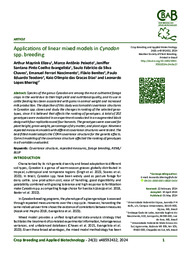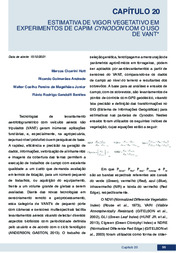Evaluation and selection of Cynodon genotypes for different soil and climate conditions in Brazil - Phase II
Evaluation and selection of Cynodon genotypes for different soil and climate conditions in Brazil - Phase II
The development of forage cultivars is important for the diversification of pastures since monoculture can lead to a drop in milk and meat production due to the reduction in forage production resulting from attacks by pests and diseases, droughts and intermittent soil flooding. Among the grasses suitable for pasture farming, the genus Cynodon has advantages such as high productivity and forage quality, responsiveness to fertilization, resistance to trampling, good adaptation to different types of soil and climate, good tolerance to humid soils and at low temperatures. Plants of the genus Cynodon have great potential for cultivation in regions with a cold climate and/or regions with intermittent soil flooding. Therefore, the objective of the project was the development of superior Cynodon clones that were tolerant to cold weather and/or waterlogging. The project achieved progress towards developing Cynodon cultivars with high production and forage quality resistant to spittlebugs and tolerant to waterlogging and cold weather. In the first stage of the project, Cynodon clones were evaluated in relation to productivity and forage quality and those selected in this process were evaluated for resistance to spittlebugs, tolerance to aluminum and waterlogging. The clones that showed superior performance in terms of evaluating biotic and abiotic stresses were selected and evaluated in different biomes, such as Atlantic Forest (Coronel Pacheco - MG and Valença- RJ) and Pampas (Pelotas - RS). The clones that showed greater stability and adaptability of forage production were selected to make the new basis for the next cycle of selection and improvement and to be evaluated for performance. To achieve these objectives, researchers from different research centers at Embrapa (Embrapa Dairy Cattle and Embrapa Temperate Agriculture) and the Federal University of Viçosa (UFV) were involved. The recommendations of this project contribute to achieving Sustainable Development Goals (SDGs) numbers 2 and 8 (Zero Hunger and Sustainable Agriculture; and Decent Work and Economic Growth), of the 2030 Agenda of the United Nations, with a focus on goals 2.3 (Productivity of small producers) and 8.2 (Productivity - Diversification, technological modernization and innovation), given that it aims at releasing new genotypes with adaptability to the extreme abiotic stress regimes that have occurred with recent climate change, without additional inputs to farmers.
Status: Completed Start date: Fri Jan 01 00:00:00 GMT-03:00 2021 Conclusion date: Tue Dec 31 00:00:00 GMT-03:00 2024
Head Unit: Embrapa Dairy Cattle
Project leader: Flavio Rodrigo Gandolfi Benites
Contact: flavio.benites@embrapa.br


